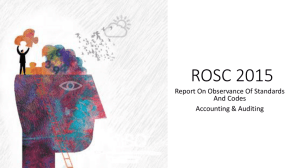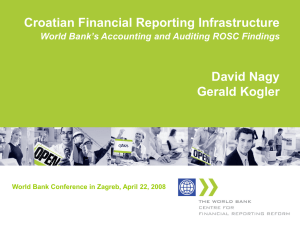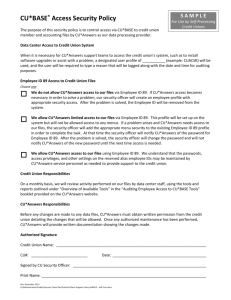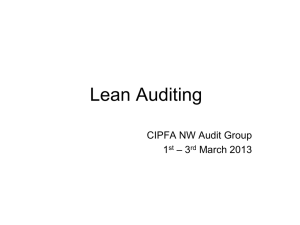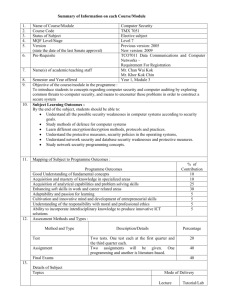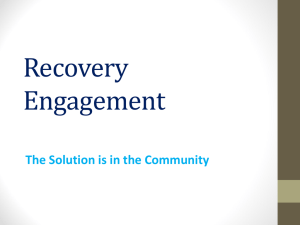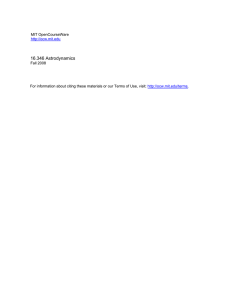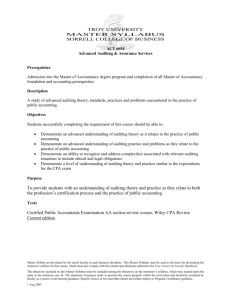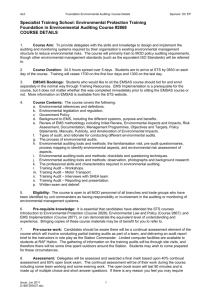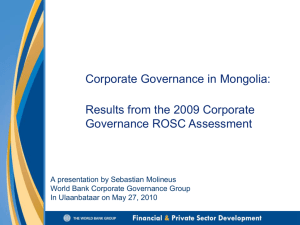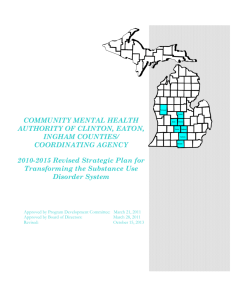Introduction à la Table Ronde, Par Monsieur Theodore O
advertisement
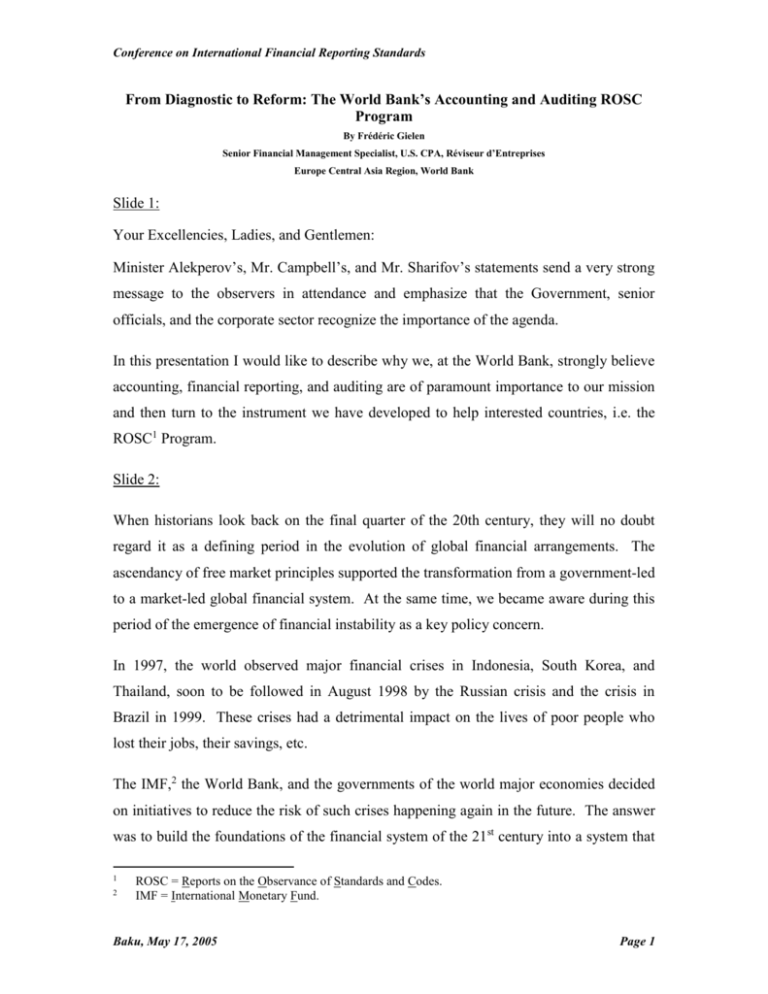
Conference on International Financial Reporting Standards From Diagnostic to Reform: The World Bank’s Accounting and Auditing ROSC Program By Frédéric Gielen Senior Financial Management Specialist, U.S. CPA, Réviseur d’Entreprises Europe Central Asia Region, World Bank Slide 1: Your Excellencies, Ladies, and Gentlemen: Minister Alekperov’s, Mr. Campbell’s, and Mr. Sharifov’s statements send a very strong message to the observers in attendance and emphasize that the Government, senior officials, and the corporate sector recognize the importance of the agenda. In this presentation I would like to describe why we, at the World Bank, strongly believe accounting, financial reporting, and auditing are of paramount importance to our mission and then turn to the instrument we have developed to help interested countries, i.e. the ROSC1 Program. Slide 2: When historians look back on the final quarter of the 20th century, they will no doubt regard it as a defining period in the evolution of global financial arrangements. The ascendancy of free market principles supported the transformation from a government-led to a market-led global financial system. At the same time, we became aware during this period of the emergence of financial instability as a key policy concern. In 1997, the world observed major financial crises in Indonesia, South Korea, and Thailand, soon to be followed in August 1998 by the Russian crisis and the crisis in Brazil in 1999. These crises had a detrimental impact on the lives of poor people who lost their jobs, their savings, etc. The IMF,2 the World Bank, and the governments of the world major economies decided on initiatives to reduce the risk of such crises happening again in the future. The answer was to build the foundations of the financial system of the 21st century into a system that 1 2 ROSC = Reports on the Observance of Standards and Codes. IMF = International Monetary Fund. Baku, May 17, 2005 Page 1 Conference on International Financial Reporting Standards is better capable of promoting robust improvements in living standards within an open international economic and political order. They identified accounting and auditing as key areas to mitigate the risk of crisis. Slide 3: We then had further evidence that bad accounting and auditing have negative consequences. With all accounting scandals we see on the screen it is now obvious that bad accounting and auditing are not only a problem in emerging countries but also in developed countries. As you know one of the consequences is that one of the major accounting firms simply disappeared. A certain Mr. Arthur Andersen in 1932 had said: “If the confidence of the public in the integrity of accountants’ reports is shaken, their value is gone.” When you see what happened to the firm bearing his name 70 years later you can see how right he was. Slide 4: What we draw from financial system crisis and company specific scandals is that good accounting and auditing make a significant contribution to financial system stability and economic growth. Without high quality information and disclosure a market economy cannot work efficiently due to distortions in resource allocation. If markets cannot work efficiently, there is less or no economic growth, which results in less or no reduction in poverty. This is why the World Bank takes a very close interest in matters of accounting and auditing. This is key to the mission of the World Bank: the fight against poverty! Slide 5: After the crisis of the late 90s, the G7 got together with the IMF and the World Bank to address this issue. The approach was to identify (sometimes, to develop) and implement a set of codes or standards that pertain to key elements of the financial system infrastructure. The codes and standards define the “rules of the game” of a well- Baku, May 17, 2005 Page 2 Conference on International Financial Reporting Standards functioning and sound financial system. This endeavor has come to be known, somewhat grandiosely, as building an international financial architecture. The objective of the new international financial architecture is to ensure the public is provided with reliable and essential information about the financial condition, performance, and risk profiles of a country’s enterprises. The Reports on the Observance of Standards and Codes, or ROSC, and more specifically the accounting and auditing review module was born in this context. Financial statements prepared and audited in accordance with reliable accounting and auditing standards is one of the pillars of this new international financial architecture. Slide 6: The ROSC has two major dimensions. One is to encourage countries to adopt international standards and codes. A second is to assess countries to measure how much progress they have made in implementing these standards. That is the purpose of the ROSC. With the permission of the country authorities, the ROSC reports are published so that international market participants can assess the degree of care they need to take when doing business in particular countries. But perhaps more importantly coming out of the ROSC assessment is a Country Action Plan to improve the quality of financial reporting in particular countries. The World Bank does not walk away, we actually stay with our “client countries” to assist them in implementing the reform agenda. After a few years we update the assessment to communicate with the outside world how much progress has been made. Slide 7: In the Europe and Central Asia region, we have already covered a majority of countries, including the countries, which have joined the European Union (EU) on May 1, 2004, the countries, which are preparing to join the EU. We are also working in Kazakhstan and Ukraine. On the bottom right hand corner of the screen, you can see some other countries Baku, May 17, 2005 Page 3 Conference on International Financial Reporting Standards elsewhere in the world where we have also conducted such assessments. All of these are countries where the World Bank lends but you will also see here the United Kingdom. The reason for mentioning all of this is to show you that we bring to the assessment all the experience we have gathered to date from more than 50 countries. Slide 8: In this context, I would like to underline the proactive role of the Azeri Government and its partners in the regulatory community and the corporate sector. Azerbaijan has expressed its willingness to conduct a ROSC accounting and auditing assessment, as done by all other countries I have just mentioned. The diagnostic review will start in June 2005 and we hope that the policy recommendations, which will be made in the ROSC accounting and auditing review, will lay the foundation for a reform agenda and a concrete action plan. These reforms will need to be squarely addressed. The task is a broad one. It hinges on ensuring a mutually supportive role between the Government, the regulators, the corporate sector, and the auditors. The Government must ensure that the various parties are endowed with the necessary means and incentives to pursue their tasks with effectiveness, with appropriate degree of autonomy, and without hindrance of conflict of interest. Given the spotlight of recent events in the United States and the European Union, the environment is probably more propitious than ever to pursue these objectives vigorously. The World Bank is honored to play an active role in this process in close coordination with our partners at the Asian Development Bank, the European Commission, and bilateral donors. Thank you. Baku, May 17, 2005 Page 4
